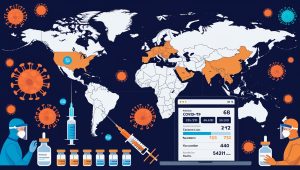
The COVID-19 pandemic has left an indelible mark on the world, reshaping how societies function and highlighting the importance of global cooperation. From its origins to the present day, the virus has challenged healthcare systems, economies, and communities worldwide. This article delves into key aspects of the pandemic’s global impact, including vaccination efforts, the evolution of variants, and measures taken to mitigate its effects.
The Global Scope of COVID-19
Since its emergence in late 2019, COVID-19 has spread to nearly every country on the planet. Its rapid transmission underscored the interconnectedness of the modern world and exposed vulnerabilities in global healthcare systems. As of now, there have been millions of confirmed cases and deaths, making it one of the most significant health crises in recent history.
Vaccination Efforts Worldwide
Vaccination has been the cornerstone of efforts to curb the pandemic. In an unprecedented scientific achievement, COVID-19 vaccines were developed and distributed in record time. Countries worldwide launched massive vaccination campaigns, prioritizing healthcare workers, the elderly, and those with underlying health conditions.
Despite these efforts, disparities in vaccine distribution remain a pressing issue. Wealthier nations achieved high vaccination rates quickly, while many low-income countries faced delays due to limited access and logistical challenges. Global initiatives like COVAX aim to address these inequities by providing vaccines to underserved regions, but progress has been uneven.
Variants of Concern
The virus’s ability to mutate has led to the emergence of multiple variants, some of which have significantly impacted the course of the pandemic. Variants such as Delta and Omicron demonstrated increased transmissibility, leading to surges in cases worldwide. While current vaccines have proven effective in reducing severe illness and death, new variants continue to pose challenges for public health authorities.
Ongoing research and surveillance are critical to understanding these variants and adapting vaccines and treatments to maintain their efficacy. Governments and healthcare organizations are working together to strengthen genomic sequencing efforts to detect and respond to emerging threats promptly.
Public Health Measures
Countries adopted a range of public health measures to control the spread of the virus, including lockdowns, mask mandates, and social distancing guidelines. While these measures were effective in slowing transmission, they also had significant social and economic consequences.
As vaccination rates have increased, many nations have eased restrictions. However, the virus continues to circulate, and public health measures remain essential in areas with low vaccination rates or during outbreaks of new variants. Personal responsibility, such as maintaining hygiene and wearing masks in crowded spaces, plays a crucial role in preventing further spread.
Economic and Social Impact
The pandemic’s economic impact has been profound, disrupting global supply chains, leading to job losses, and triggering recessions in many countries. Governments have implemented stimulus packages to support businesses and individuals, but recovery has been uneven. Certain sectors, such as travel and hospitality, continue to struggle, while others, like technology, have thrived during the crisis.
Socially, the pandemic has reshaped how people interact, with remote work, online education, and telemedicine becoming the norm. While these changes have brought convenience, they have also highlighted issues of inequality, particularly for those without access to digital infrastructure.
Hi, this is a comment.
To get started with moderating, editing, and deleting comments, please visit the Comments screen in the dashboard.
Commenter avatars come from Gravatar.